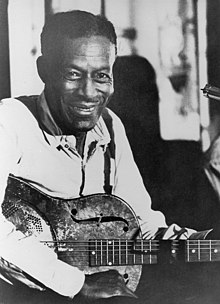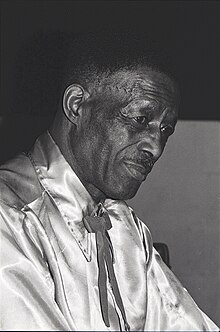Son House | |
|---|---|
 | |
| Background information | |
| Birth name | Edward James House Jr. |
| Born | March 21, 1902[a] Lyon, Mississippi, U.S.[b] |
| Died | October 19, 1988 (aged 86) Detroit, Michigan, U.S. |
| Genres | Delta blues |
| Occupation | Musician |
| Instruments |
|
| Years active | 1930–1943, 1964–1974 |
| Labels | |

Edward James "Son" House Jr. (March 21, 1902[a] – October 19, 1988) was an American Delta blues singer and guitarist, noted for his highly emotional style of singing and slide guitar playing.
After years of hostility to secular music, as a preacher and for a few years also working as a church pastor, he turned to blues performance at the age of 25. He quickly developed a unique style by applying the rhythmic drive, vocal power and emotional intensity of his preaching to the newly learned idiom. In a short career interrupted by a spell in Parchman Farm penitentiary, he developed his musicianship to the point that Charley Patton, the foremost blues artist of the Mississippi Delta region, invited him to share engagements and to accompany him to a 1930 recording session for Paramount Records.
Issued at the start of the Great Depression, the records did not sell and did not lead to national recognition. Locally, House remained popular, and in the 1930s, together with Patton's associate Willie Brown, he was the leading musician of Coahoma County. There he was a formative influence on Robert Johnson and Muddy Waters. In 1941 and 1942, House and the members of his band were recorded by Alan Lomax and John W. Work for the Library of Congress and Fisk University. The following year, he left the Delta for Rochester, New York, and gave up music.
In 1964, Alan Wilson, co-founder of the band Canned Heat, found House and had him listen to his old recordings. He encouraged him to find his way back to the music and from this collaboration, Father of Folk Blues was born. Wilson even played second guitar on “Empire State Express” and the harp on ”Levee Camp Moan”. Son's manager Dick Waterman said,” Al Wilson helped Son House find Son House”. He relearned his repertoire and established a career as an entertainer, performing for young, mostly white audiences in coffeehouses, at folk festivals and on concert tours during the American folk music revival, billed as a "folk blues" singer. He recorded several albums and some informally taped concerts have also been issued as albums.[1] In 2017, his single "Preachin' the Blues" was inducted into the Blues Hall of Fame.[2]
Cite error: There are <ref group=lower-alpha> tags or {{efn}} templates on this page, but the references will not show without a {{reflist|group=lower-alpha}} template or {{notelist}} template (see the help page).
- ^ Beaumont, Daniel (2011). Preachin' the Blues; The Life and Times of Son House. Oxford University Press. ISBN 978-0-19-539557-0.
- ^ Cite error: The named reference
HOFwas invoked but never defined (see the help page).